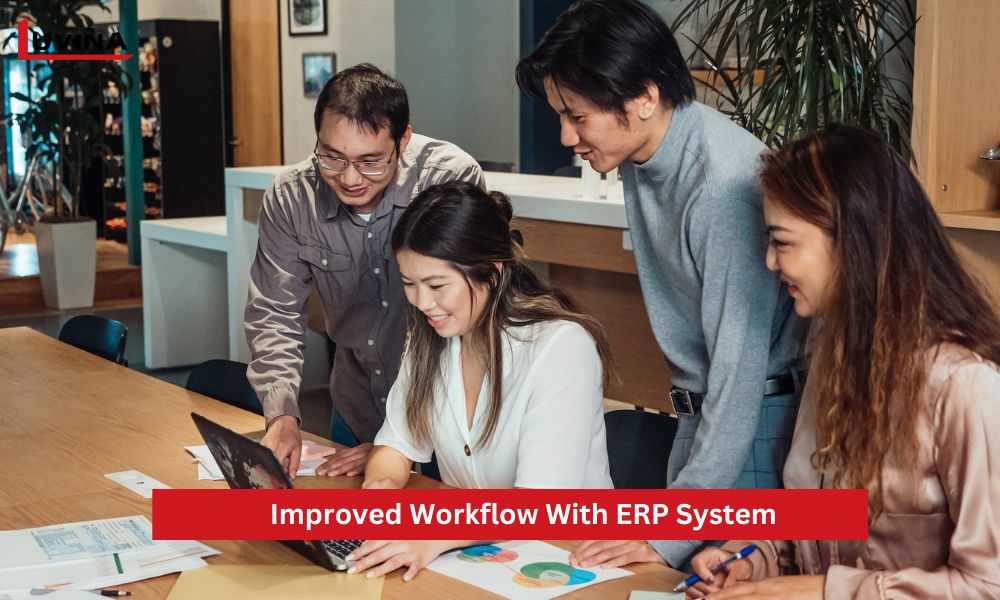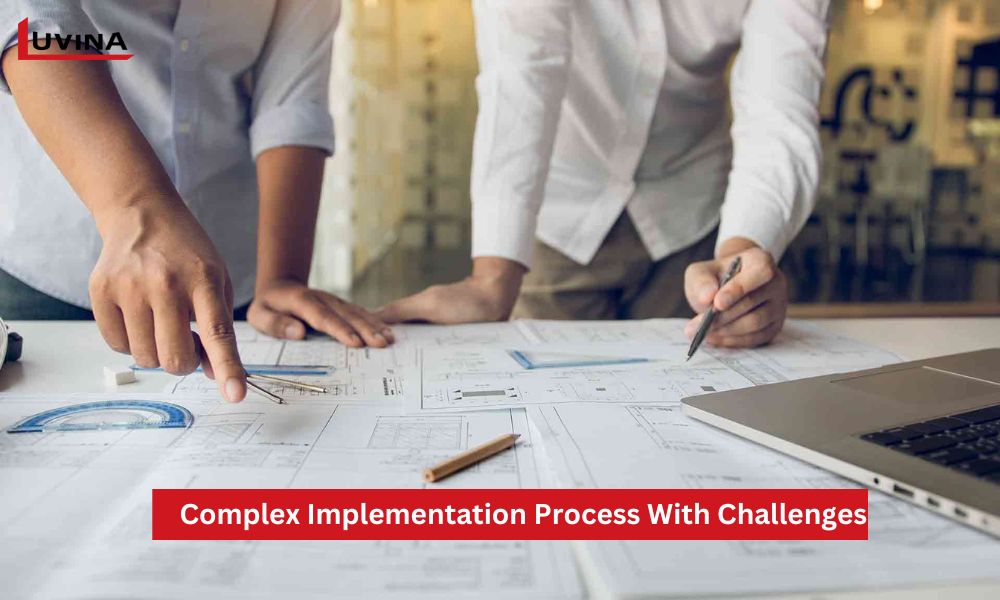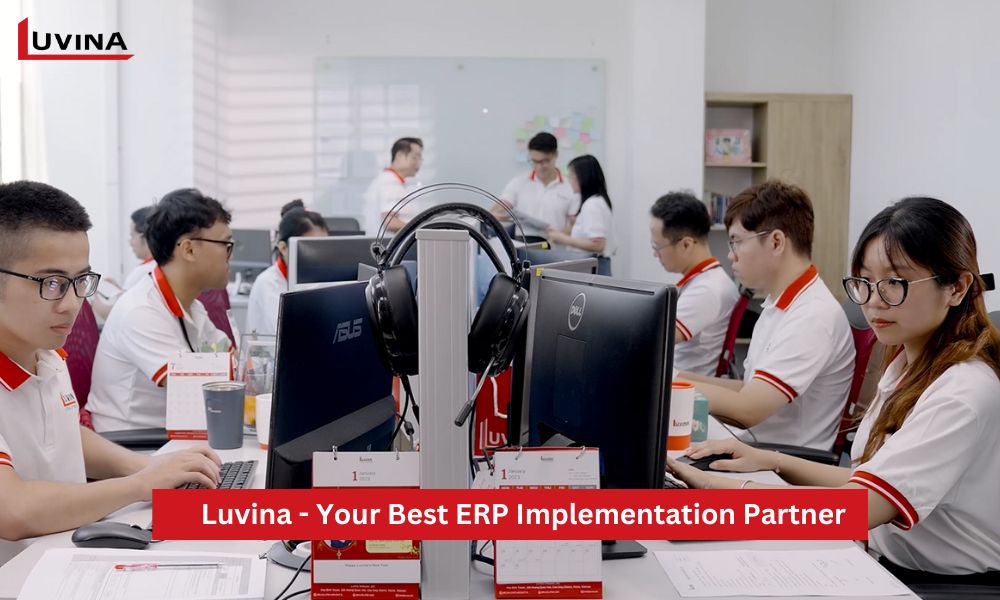Implementing ERP is a deep, complex process that requires a team of experts. Therefore, businesses need to turn to ERP implementation companies like Luvina to increase the success rate of their ERP projects. With over 20 years of experience working with clients in both Vietnam and Japan, Luvina – one of the best ERP implementation companies – promises to deliver optimal ERP implementation services for businesses to enhance processes and gain a competitive edge in the fiercely competitive market.
ERP Implementation Benefits
With the ability to automate processes and provide centralized data storage for every department within a business, ERP brings the following benefits:
- Standardization of workflows: ERP automates business processes according to suitable standards, enhancing operational efficiency for the entire enterprise.
- Enhanced security: ERP provides features such as advanced data encryption, multi-factor authentication, etc., to enhance security.
- Compliance with regulations and laws: ERP is designed to comply with all complex regulations. The system also provides real-time assessments of regulatory compliance and alerts when necessary.
- Risk reduction: ERP helps businesses better control processes to reduce unwanted incidents.
- Increased productivity and operational efficiency: All tasks are automated, helping to accomplish more tasks with fewer resources and saving time.
- Cost savings: Managing data and processes with just one centralized platform helps reduce errors and unnecessary manpower, allowing employees to focus on tasks to achieve productivity, thereby optimizing costs.
The benefits of ERP mentioned above will contribute to improving business efficiency in every aspect. However, not every business has the capability to implement complex ERP processes on its own. Therefore, businesses need to turn to ERP implementation services to:
- Access to reliable information and data: Collaborating with successful ERP implementation companies helps businesses monitor all processes within the company and access data directly. Centralized data management improves data integrity and reliability.
- Improved visibility and planning: Using ERP implementation services to create an ERP system allows employees to observe all data related to their department, providing a solid foundation for planning for both the department and the entire company.

- Enhanced collaboration: By using ERP implementation services, businesses will have a centralized platform for all employees to share data, reduce information discrepancies, and promote collaboration between departments.
- Improved quality of customer service: ERP implementation services help businesses create a centralized customer information platform to provide better quality services.
Challenges of ERP Implementation
ERP implementation is a difficult procedure that calls for the participation of experts in the field. In the absence of ERP implementation services’ support, enterprises could encounter the following difficulties:
- Opposition to change: Despite the numerous advantages of ERP implementation services, it makes sense that a company department would be reluctant to move to a new system, particularly if the old one is still operating well. Employee resistance to change frequently arises from a lack of understanding regarding the significance of ERP implementation.
- Cost of implementation and maintenance: Because businesses misjudge the amount of work needed to make the switch to the new system, many ERP projects end up costing more once they are put into place. Furthermore, a lot of organizations tend to forget about certain crucial expenses during the planning stage, such as maintenance charges, hiring experts, or training fees.

- Unfamiliarity with key features: Many businesses miss out on the opportunity to automate processes and leverage specific functions because they are unaware of the available features within the ERP system or do not know what they are currently using.
- Data quality during migration: The process of “cleansing” data before transitioning to a new system encounters many difficulties due to the information stored in various formats, duplicated data, or conflicts. The more data there is, the harder it is to handle.
- Project management: ERP implementation projects involve multiple stages such as planning, designing, data migration, testing, etc. Very few companies can handle all of these stages on their own. That’s why businesses need the assistance of ERP implementation consultants and ERP implementation services.
Above are just 5 of the many challenges that businesses may encounter during the ERP implementation process. The good news is that you can completely avoid or minimize errors during the implementation process by partnering with Luvina – one of the best ERP implementation companies in Vietnam.
Why choose Luvina’s ERP implementation services?
Instead of struggling with ERP systems on your own, collaborate with Luvina, one of the best ERP implementation companies in Vietnam.
With over 20 years of experience working, Luvina’s experienced development team can help you build an ERP system from scratch or customize your existing system through integration.
Through reputable ERP solutions like Grandit, DynamicAX, Workday, SAP, and Oracle, Luvina offers the best ERP implementation services to realize the system that customers desire transparently and cost-effectively.
- GrandIT: One of the most popular ERP solutions in Japan, successfully implemented by Luvina in collaboration with Japanese clients.
- DynamicAX (a.k.a. Microsoft Dynamics 365 Finance and Operations): Provides suitable solutions on DynamicAX to streamline operations and enhance financial management.
- Workday: Implements Workday services to provide cloud-based financial and human resources management solutions tailored to the customer’s needs.
- SAP: Offers software systems to help businesses manage financial processes, operational processes, and customer-related processes.
- Oracle: Provides solutions to automate operational processes, especially financial management and customer management features.

Until now, Luvina has experience in providing various ERP implementation services including consulting, implementing, upgrading, and customizing ERP features for customers, such as:
- – Accountants
- – Production management
- – Inventory management
- – Sales management
- – Workforce & payroll management
Creating innovative solutions tailored to the unique needs of customers is Luvina’s core mission. We are committed to:
- – Providing the best quality services that meet ISO 9001 and CMMI Level 3 standards.
- – Offering flexible human resources with over 750 experienced IT professionals, capable of expanding team sizes according to business requirements.
- – Providing 24/7 communication and support in both Japanese and English, regardless of time zone.
Contact Luvina now for the best ERP implementation services for your business.
FAQs
What are the 5 stages of the implementation of ERP?
- Customization
- Implementation team training
- Testing
- Go-Live & Deployment
- Operation & Maintenance
Why is ERP difficult to implement?
ERP systems are challenging to implement due to their complex technical requirements and the need for significant resources.
How long does it take to implement an ERP system?
The time required to implement an ERP system depends on the organization’s scale, project complexity, and type of ERP system. The average implementation time is typically between 6 months and 1 year.
What is the failure rate of ERP implementation projects?
According to statistics, between 50% and 75% of ERP implementation projects fail to achieve their objectives.
How much does ERP implementation cost?
A mid-sized enterprise can spend anywhere from $50,000 to $1,000,000 to implement an ERP system (excluding software licensing fees). The specific cost of ERP implementation also depends on system features, customization level, number of users, etc.









Read More From Us?
Sign up for our newsletter
Read More From Us?
Sign up for our newsletter